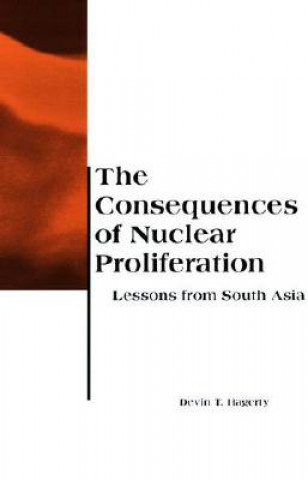
Doručení
Nákupní rádce





Nehodí se? Vůbec nevadí! U nás můžete do 30 dní vrátit
 Dárkový poukaz
V libovolné hodnotě
Dárkový poukaz
V libovolné hodnotě
S dárkovým poukazem nešlápnete vedle. Obdarovaný si za dárkový poukaz může vybrat cokoliv z naší nabídky.
Consequences of Nuclear Proliferation
 Angličtina
Angličtina
 24 b
24 b
30 dní na vrácení zboží
Mohlo by vás také zajímat


Analysts of international politics have debated heatedly over the likely consequences of the spread of nuclear weapons. Most argue that nuclear proliferation will destabilize the world and increase the risk of nuclear war. Others counter that the threat of nuclear war is enough to convince new nuclear nations to adopt prudent security policies.In this book, Devin Hagerty examines the relationship between two emerging nuclear powers--India and Pakistan--to assess how nuclear weapons have changed their foreign and military policies. Even before India and Pakistan tested nuclear weapons in 1998, both countries believed that the other was capable of assembling a bomb. In recent years, their respective governments had conducted diplomacy in the shadow of those nuclear suspicions. India and Pakistan have fought three wars since becoming independent in 1947 and their relations remain tense, especially over the disputed border region of Kashmir.Hagerty presents detailed studies of the January 1987 Indo-Pakistani crisis, precipitated by India's "Brasstacks" military exercises, and the 1990 confrontation over Kashmir. He finds that the two countries nearly went to war in the "Brasstacks" crisis, at least partly because Pakistan's nuclear capability remained nascent. In the 1990 crisis, however, both countries were aware of the possibility of nuclear escalation and acted more cautiously. Hagerty finds little evidence of preparations for preemptive nuclear strikes in the 1990 crisis. Instead, India and Pakistan appear to have embraced the logic of nuclear deterrence. Hagerty concludes that relations between India and Pakistan in recent years support the argument that nuclear proliferation does not necessarily destabilize international relations and may even reduce the risk of war. This conclusion is grounds for optimism about peace in South Asia now that India and Pakistan are overt nuclear-weapons states.
Informace o knize
 Angličtina
Angličtina




 Jak nakupovat
Jak nakupovat



























